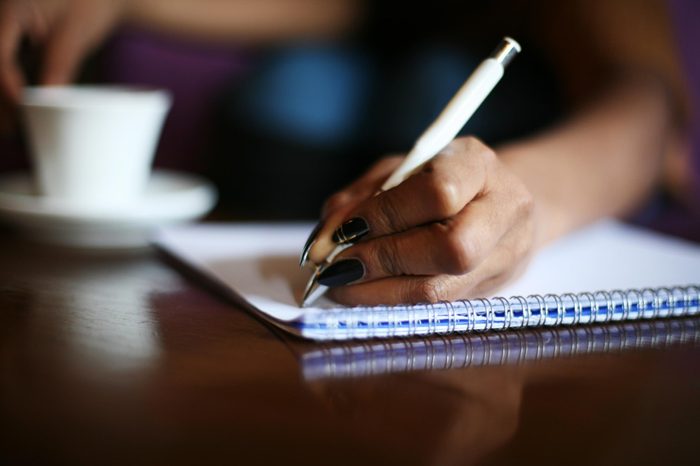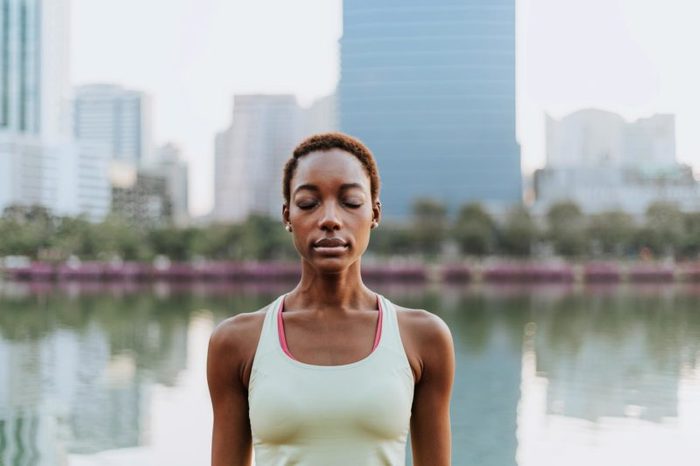The daily challenge of anxiety
If you struggle with anxiety, it may sometimes seem like the fearful thoughts will never end. But anxious feelings peak at 120 seconds on average, says Christina Brooks, a psychologist at the Center for Anxiety & Behavioral Change in Rockville, Maryland. After that, your feelings of physiological arousal start to diminish, no matter what. Although anxiety is unpleasant, our experts agreed that it’s important to face it head-on sometimes. A key step is “accepting that anxiety is a normal, natural part of life,” says Dr. Brooks, “and not always trying to push it away, but knowing that it’s there as an uncomfortable experience and having the willingness to be with it.” These science-backed strategies will help you cope in the moment.

Focus on your five senses
“Our anxiety gets worse when we’re focused on our fear cues, things in our environment or within ourselves that we notice right away and that validate our beliefs,” says Dr. Brooks. Say you’re giving a presentation and you notice audience members frowning. Focusing on them—or on your sweaty palms—will only increase anxiety. “What we want to do is retrain our attention to focus on other things in our environment,” says Dr. Brooks. Try thinking about what you can see, hear, smell, feel, and taste instead. “That shifts our attention off those fear cues and that can help drive down our anxiety in that moment.” Not sure if what you’re dealing with is normal? Check out these signs you could have an anxiety disorder.

Find joy
“It’s hard to be anxious when you’re having fun,” says Dr. Brooks. She recommends concentrating on the enjoyable parts of your situation whenever possible. For example, if you’re stressed about an important meeting, ask yourself what you can learn from the person or other people in the meeting, or what positive benefits you’ll get out of the meeting. “There’s a lot of research out there that supports the efficacy of mindfulness in managing and treating anxiety, and this is one of those parts of mindfulness, being aware of the more enjoyable aspects of a situation,” she adds.

Accept your anxiety
Some experts say that the best way to deal with anxiety is to simply face it. “The tendency of anxiety is when a person bottles it up or tries to avoid it, that’s actually what makes the anxiety increase over time,” says David Rosmarin, PhD, assistant professor at Harvard Medical School and founder and director of the Center for Anxiety in New York and Massachusetts. He suggests “letting it ride” rather than fighting it off. “When a person gets to a state of acceptance, they realize that there’s nothing to fear,” he explains. “What perpetuates fear is when people have a negative reaction to the fear.” To figure out what you’re dealing with, read up on things only people with anxiety will understand.

Take action
Anxiety can make you feel paralyzed—but often the best way to fight it is to simply move forward. “Anxiety is amplified through avoidance,” says Dr. Brooks. “If we are trying to push away those feelings of anxiety, we’re actually increasing the anxiety in the long run because we aren’t learning that although anxiety is uncomfortable, it’s really harmless. Avoidance is the thing that ruins people’s lives.” So take a deep breath, give yourself a “Three, two, one, go!” countdown, and take a step toward the situation that you’re anxious about. You got this.

Think about where you feel it
Another way to practice mindfulness when you’re anxious? Focus on where you feel your symptoms, says Dr. Rosmarin. Maybe your stomach feels upset and your breathing has sped up, or perhaps your thoughts are all over the place. “Just observe yourself feeling anxious,” says Dr. Rosmarin. “Being present means surfing your anxiety, not running away from it.” Before you know it, those symptoms will start calming down.

Stop judging yourself
There’s no need to feel bad about your anxiety. In fact, 40 million American adults have an anxiety disorder, making it the most common mental illness in the country, according to the Anxiety and Depression Association of America. You’re not alone—but feeling guilty about your struggle could make the feelings worse. “Anxiety is just part of the human experience,” says Dr. Rosmarin. “It doesn’t mean something is wrong with you. It’s part of life, and it’s not a reasonable expectation for people to have of themselves or others, that they should never be anxious.” Here’s how to tell the difference between depression and anxiety.

Recite a coping statement
A little positive self-talk can go a long way. Some recommended coping statements from Dr. Brooks: “Anxiety is temporary and harmless,” “Just because I’m scared doesn’t mean anything bad is going to happen,” and “I can take this one moment at a time.” She also points out that the body’s response to anxiety is similar to its response to excitement—so try telling yourself, “I’m nervous about this, but I’m also excited about what could happen.” Reframing your mind can help you get the anxiety to a more manageable place, says Dr. Brooks, so you can handle what really matters. Here’s what you should never say to someone with anxiety.

Picture a peaceful place
Whether you’re thinking about a favorite spot or imagining that you’re rocking back and forth in a hammock, visualizations are a tried-and-true relaxation tool. You can also pretend you’re on a float in the ocean—with each inhale, the waves pull you out, and with each exhale, the waves pull you in. Or if you want to stay more focused on the present moment, says Dr. Brooks, you can imagine yourself succeeding at whatever you’re anxious about—or picture how you would cope if it didn’t go well. Rehearsing your reaction ahead of time can help you realize you’ll be OK no matter what.

Squeeze your muscles
Progressive muscle relaxation is a technique that, when paired with deep breathing, can help lower physiological arousal, says Dr. Brooks. To try it, tense and release each muscle group in your body (forehead, jaw, arms and shoulders, and so on) one at a time. Your body will feel more relaxed after—and it may help you recognize stress in the future. “We’re not always aware of how our body changes when we’re feeling anxious,” says Dr. Brooks. “If we’re practicing progressive muscle relaxation, we can become more aware of what that tenseness does feel like. We can then be more focused and prepared.” Keep in mind other sources of trouble: These medical conditions could be triggering your anxiety.

Think about something funny
“Trying to change the emotion can be really helpful,” says Dr. Brooks. That could mean focusing on an amusing memory or pulling up a funny video on your phone. Just be careful that you’re not entirely avoiding what’s making you anxious. “Some level of avoidance or distraction is OK,” says Dr. Brooks. “But if that becomes your primary coping mechanism, then you’re really doing the opposite of what’s helpful.” So savor that laughter—and then move on to deal with that anxiety.

Do something that makes you uncomfortable
Want to help decrease your overall anxiety? Once a day, do something that makes you feel uncomfortable or afraid, says Dr. Rosmarin. If you’re stressed about social situations, ask a stranger for the time. If you’re worried a teacher will judge you, raise your hand in class. If you feel pressure to always be perfect, wear an outfit that doesn’t match. “People often have fears in their head that just aren’t true,” says Dr. Rosmarin. “This helps them overcome it by getting new information.” And don’t miss this crucial advice from social anxiety disorder experts.

